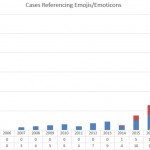
New Paper Explains How FOSTA Devastated Male Sex Workers
I call your attention to a new article: David Eichert (a JD/PhD student), “‘It Ruined My Life’: FOSTA, Male Escorts, and the Construction of Sexual Victimhood in American Politics,” 26 Virginia Journal of Social Policy & the Law 201 (Winter…

Can a Retweet Constitute Copyright Infringement? Uh….–Bell v. Chicago Cubs
Bell authored a book called “Winning Isn’t Normal.” He got a copyright registration for the book and a separate registration for a 241 word passage from the book (I won’t include that passage here for reasons that soon will be…

Video Excerpts Qualify as Fair Use (and Another 512(f) Claim Fails)–Hughes v. Benjamin
Hughes is a YouTuber. She made a 10 minute video of Hillary Clinton’s election night party called “We Thought She Would Win” and posted it to her channel. Benjamin also is a YouTuber, but on the opposite end of the…

Google Search Qualifies For Section 230, Whether or Not It’s a “Platform”–Chukwurah v. Google
This is a prisoner pro se lawsuit. “The Complaint avers that beginning February 28, 2014, Google identified Chukwurah as a ‘a triple murderer serving 50 years in a Maryland,’” allegedly because of false court documentation. The court explains: the Court,…

Can a “Fire” Emoji Support a Manslaughter Conviction?–Johnson v. State
Johnson and Roe were drug users. They split a purchase of heroin, which turned out to contain fentanyl. Roe died from ingesting it. Johnson was charged with, among other things, involuntary manslaughter for providing the heroin to Roe. The court…

Nextdoor Post Isn’t Protected by Anti-SLAPP Law–Jeppson v. Ley
Nextdoor is a social networking service for neighborhoods. This case involves an unspecified neighborhood, somewhere on the west side of the LA basin, with 951 neighbors. The underlying dispute involves a triad of neighbors, Jeppson, the Leys, and Cates. Ley’s…
Santa Clara Law Is Hiring a Privacy Law Fellow for 2020-21
We’re hiring a Privacy Law Fellow for 2020-21, with the expectation that the term would extend another year if both sides are happy. The priority deadline is February 21. I’d be grateful if you could help spread the word. If…

FOSTA Constitutional Challenge Revived–Woodhull Freedom Foundation v. US
The DC Circuit revived the EFF-led constitutional challenge to FOSTA, holding that at least two of the plaintiffs have standing. This raises the specter that key parts of FOSTA might still be struck down as unconstitutional. Among other things, FOSTA…

2019 Emoji Law Year-in-Review
Some highlights from emoji law in 2019: (Continued) Exponential Growth of Case References I found 101 cases in 2019 that referenced “emoji” or “emoticon.” That nearly doubles the number from 2018, reinforcing that emoji law continues to grow exponentially. You…

Facebook Still Isn’t Obligated to Publish Russian Troll Content–FAN v. Facebook
In response to Russian interference with our 2016 presidential elections, Facebook belatedly purged content that it believed came from Russian trolls. That crackdown shut down the account of the “Federal Agency of News” (FAN), which allegedly has ties to Russia’s…
